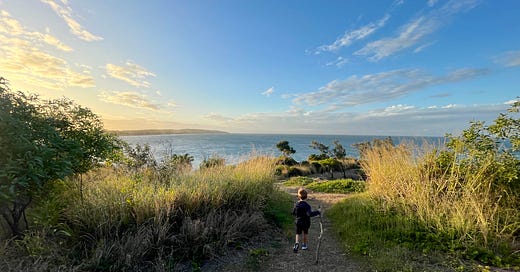Here’s a conversation I had with my 6-year-old son a few months ago.
“Dad, what kind of boat is that?”
“It looks like a container ship — they’re these really huge boats with big boxes on them that take stuff from one country to another across the ocean.”
“What kind of stuff?”
“Oh, it depends on the ship. Toys. Cars. Clothes. It could be anything.”
“Where do you think that one’s going?”
“I don’t know. Where do you think it’s going?”
“China?”
“Maybe. Let’s see if we can find out!”
This led us to discover a free phone app called Marine Tracker, which taps into the GPS signals and logs of every commercial (and many private) boats in transit all over the world, so you can click on their icon on the map and see a picture of the boat, its country of origin, and what kind of cargo it’s hauling — or whether it’s a fishing boat or pleasure craft.
My son and I have a blast with this app. We whip it out just about every time we go to to the beach. He loves being able to see a boat miles away on the horizon, click on an icon on the map, and learn everything about it.
But there’s this part of me that feels ambivalent about this power. Why? Because as a kid, I remember standing at the beach on those rare family trips to the Outer Banks in North Carolina, watching distant boats and wondering where they were going. I remember imagining stories about the people on them, where they were headed, where they came from — and imagined I was on one of those boats myself.
Today, my son doesn’t have to wonder. I can satisfy his wonderful curiosity — and I can do it instantly, on demand.
We all can, with basically any question we can imagine. If you have curiosity about almost any scientific fact or data point relating to your life, the answer is probably available to you somewhere. It’s likely not even particularly hard to find. Most of the answers are sitting in your pocket right now, just a few seconds away from being displayed on a screen in front of you.
We have a whole lot of knowledge, and not much mystery.
This is a good thing.
But…
Is it also a little bit of a bummer?
I know you’re adults. I am too. But I still get that very childish twinge of sadness over the fact that the world has been mapped. There are no more expeditions to unknown places, at least not on earth. Artificial intelligence is filling in our gaps in knowledge faster than ever.
So, what’s left? Is there anything to feel awe over, that feeling of immense mystery? Sure, space is big and immense and mysterious. But that’s, you know, out there. At least for now.
Is there anything here on earth to discover by people?
What about… people?
The final frontier, it turns out, is you.
It’s me. It’s my partner. My sons. The new coworker I just met.
It’s the 267 new human beings born every minute on earth.
Each one a conscious, cognitive mystery, a collection of thoughts and feelings whose exact arrangement is entirely unique and unknown to everyone but themselves.
The world will never run out of mysteries because we will never stop supplying them ourselves — they are ourselves.
I can learn everything there is to know about human biology, psychology, cognitive science, anthropology, human history. Everything there is to know about a specific culture, a community, the social factors that influence our development. I can know everything, or at least I can find everything on Google or by asking ChatGPT.
That is, until a person walks into the room, an individual person, at which point none of that knowledge can tell me what it is like to be that person. What that person thinks and feels. Who they are. Even if I had their genetic report — it turns out genes are extremely environment-dependent (influenced by our experiences) and interconnected. There is no “gene for height,” for example — there are several hundred of them or more.
And just as soon as we have someone figured out, then they surprise us with some new beautiful (or infuriating) mystery.
Even if that person becomes less mysterious over time, there will always be more people, more mysteries, more experiences that reveal mysteries within the people we already know.
I think what frightens many of us about AI, what leads many of us to believe in conspiracy theories and unproven remedies, is that we are made anxious by the lack of mystery.
Every corner of the map is filled. Machines can do much of what we can do, faster.
I see it in the academic world. Researchers are encouraged to find extremely specific niches for their research — why? Because the big questions have mostly been answered. And so we’re encouraged to make our questions smaller, more specific, more focused on a particular subset of data.
So where is the mystery? Where can we go to find that feeling of awe at wondering where the boats are going?
It’s in you and me.




